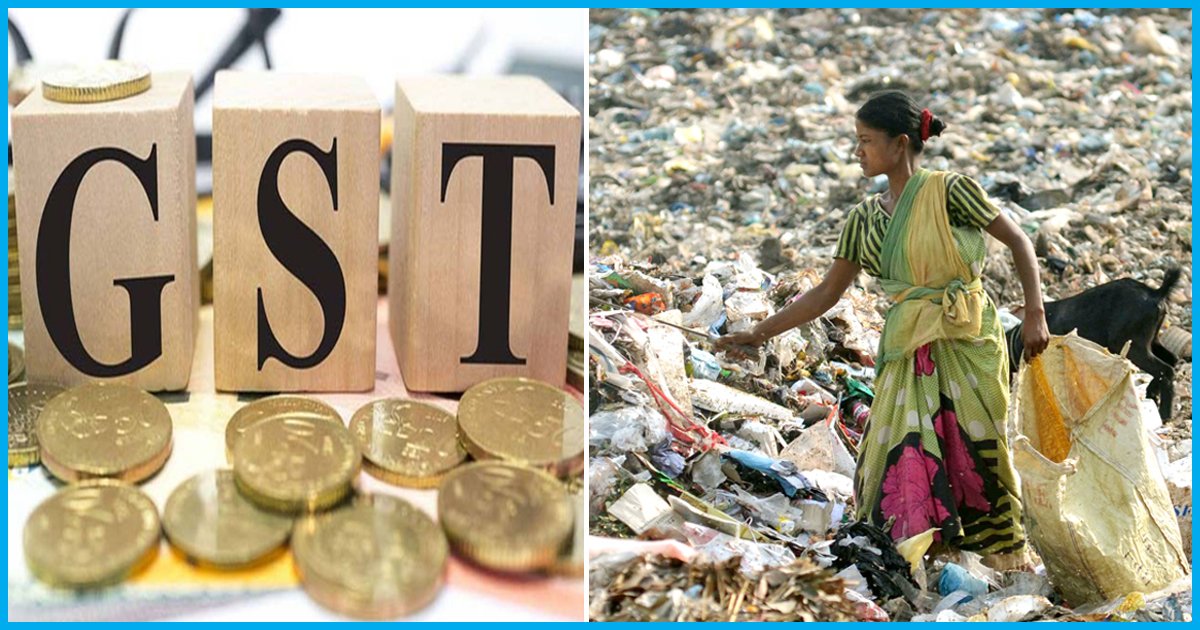
Ragpickers And The Movement To Tackle Waste Management Are Threatened Under GST
28 July 2017 11:39 AM GMT
The Goods and Services Tax (GST), India’s largest taxation reform, was rolled out on 1 July. Several articles and professions have fallen under the all-encumbering arena of GST. But could one imagine that even GST would have adverse effects on the environment?
With tax rate on recycled plastic shooting up from 5.5% to 18% post-GST, rag-picking does no longer seem to be a viable profession, as reported by The Hindu.
Let’s talk about Nagaratna and her Self-Help Group (SHG) at Mahadevapura, Bangalore. After almost a month of GST implementation, the Mahadevapura Mahila Okkuta, a group of 17 SHGs that collect and segregates waste in Garudacharpalya is actually looking at the prospect of their profits being completely wiped out. Prior to the implementation of GST, they made Rs 30,000 surplus every year. Their dire situation has even forced them to cut down on expenses like providing lunch to the workers.
How GST has hit waste managers
Post-GST, 18% tax has been imposed on recycled plastic waste; this has adversely affected the prices in the waste recycling markets. Plastic recyclers are saying that with the new tax system, they are facing a slash on the profit margins they had earlier. They have to slash the price at which they buy from the thousands of waste managers and rag-pickers. Prices of mixed plastic have come down to Rs 13 per kg from Rs 19 per kg. Prices of milk covers have come down to Rs 7 per kg from Rs 16 per kg and glass bottles have come to 50 paise per kg instead of Rs 1.5 per undamaged bottle.
The margins are tiny and with the sinking margins, their business has been affected adversely. Since this is an informal sector, rag pickers don’t have a Taxpayer Identification Number and tax paid by the recyclers are collected from the waste managers. The prices are no longer lucrative and waste managers have stopped selling recyclable waste items. Jali Moholla is one of the largest open markets for selling waste products and sudden inclusion of taxes has resulted in the low purchase of waste products.
Effect on civic corporation
Rolling out GST has also adversely hit the functioning of the city civic corporation. The present system has outsourced the sweeping of streets, collection of segregated waste and collection from homes. These activities have become ‘service’ and liable to be taxed under the GST regime. The corporation spends Rs 400 crore annually on this sector and the 18% GST shall burden it further with Rs 72 lakh annually.
GST effect in Delhi waste management scenario
With the resale value on glass bottles becoming minuscule after the GST, waste collectors have been advising people to dump bottles in the trash which would not decompose ever and would result to landfill, reported The Indian Express. Waste collectors said that previously a 750ml wine bottle would get them 1 Rupee per bottle, now to get the amount, one would have to sell kilos of bottles to fetch the same amount. Waste pickers have asked customers to stack the bottles and sell it later in the hope that prices might shoot up, later.
This will have an obvious effect on the environment and the GST shall also affect the livelihood of the ragpickers. Most of them are migrants and waste picking is their sole way of earning a livelihood. In a city that has an enormous number of 3-4 lakh of workers from the sector of waste management, it is an informal sector. 60% of recycling and waste management is done in the informal sector. The GST and its impact shall disrupt the glass recycling sector, which amounts to 6% of municipal solid waste.
The effect of GST has also adversely hit the scrap market as well. Contractors who used to collect scrap from small waste collectors have stopped collecting scrap materials. The police have started demanding ‘invoice’ which they couldn’t produce and this is also one reason for the scrap market to be adversely hit by GST.
The Logical Indian community urges the government to revise the GST rates which are encumbering these ‘services’. Apart from having effects on the environment, such kind of taxation is also affecting the livelihood of thousands of workers who are associated with the informal sector of waste management. The taxation rate, in this case, must be modified and set at a moderate rate.
 All section
All section













